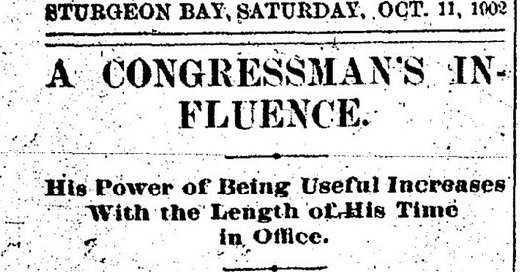“A Congressman’s Influence” from the October 11, 1902 Advocate
A CONGRESSMAN’S INFLUENCE
—————⬤—————
His Power of Being Useful Increases With the Length of His Time in Office.
—————⬤—————
“It is certainly astonishing,” remarked a member of the house of representatives, according to the Washington Star, “how blind to their own interests are the constituencies of some representatives. This fact is essentially borne in upon me about the time of the year, when nominations for the next congress are being made.
A congressional representative is of value to his constituents in just the proportion that he can be useful to them and serve their interests. The power of being useful consists of these things: Ability to secure legislation affecting the local needs of the people of his district or section: ability to secure departmental rulings affecting his constituents and their interests; ability to secure patronage for his people from whatever source it may exist.
“After all, those are the chief ends and aims of a representative. It is assumed that he is patriotic and working for the welfare of the whole country, but in these days when there are so many conflicting interests in legislation, his main duty is to the people who elected him. He is a public servant, literally.
“Now, the representative’s ability to do the things set forth above depend upon the influence obtained by long service in congress. When he comes to congress his abilities will secure place for him in the line of promotion, but in order to reach the goal where he can be of use to his people he must be retained in his seat.
“To illustrate, John Doe is elected to congress; he is a man of importance in his section; he lives in the big white house on the hill and is the finest lawyer in the county. Perhaps he has served in the legislature and is known even in the next district. When he reaches Washington he finds he is one of 357 others, most of them his equal and many of them his superior in the qualities which have brought success in politics.
“Mr. Doe” is ambitious to go the most influential committees. He wants to break into national legislation right away. But there are others before him whose claims must be considered, men who have been serving for years in congress, who commence at the foot of the committee list and have gradually moved up as vacancies occurred.
“So, when the speaker announces his appointments Mr. Doe finds himself at the bottom of the lists on a number of unimportant committees. He is lucky if he gets on even a fourth-rate committee, and no kind of chance will he get on a first-class committee.
“If his constituents are wise, however, and keep him in congress, assuming, of course, that he is efficient and industrious, within two or three terms he will find himself up near the top of the list. That is because so many men are turned out of congress at the end of every session, failing of renomination by their constituents. Ultimately, Mr. Doe finds himself near the head of appropriations, of ways and means, of rivers and harbors, of public buildings and grounds, of judiciary, claims, or Indian affairs, or military affairs, or whatever committee is most closely identified with his people’s affairs.
“Next he becomes chairman. Then he begins to wield some influence in Washington. Heads of the executive departments discover that he is on earth. He has the run of the Whitehouse and sees his name mentioned in important conferences of the rulers. He has influence with his colleagues on other important committees of the house, because he can exchange favors.
“Just about this time, when he is of some practical value to his people, a hue and cry is raised against him. ‘Turn him out, he has been in office long enough.’ Half a dozen ambitious young lawyers are anxious to supplant him and stimulate the cry of rotation in office. He is refused nomination, and his successor comes down to Washington next term to take a seat far back in the rear, to jog along for years before gaining the position of influence which the other man had won by hard work and seniority.”
Courtesy of the Door County Library Newspaper Archive



